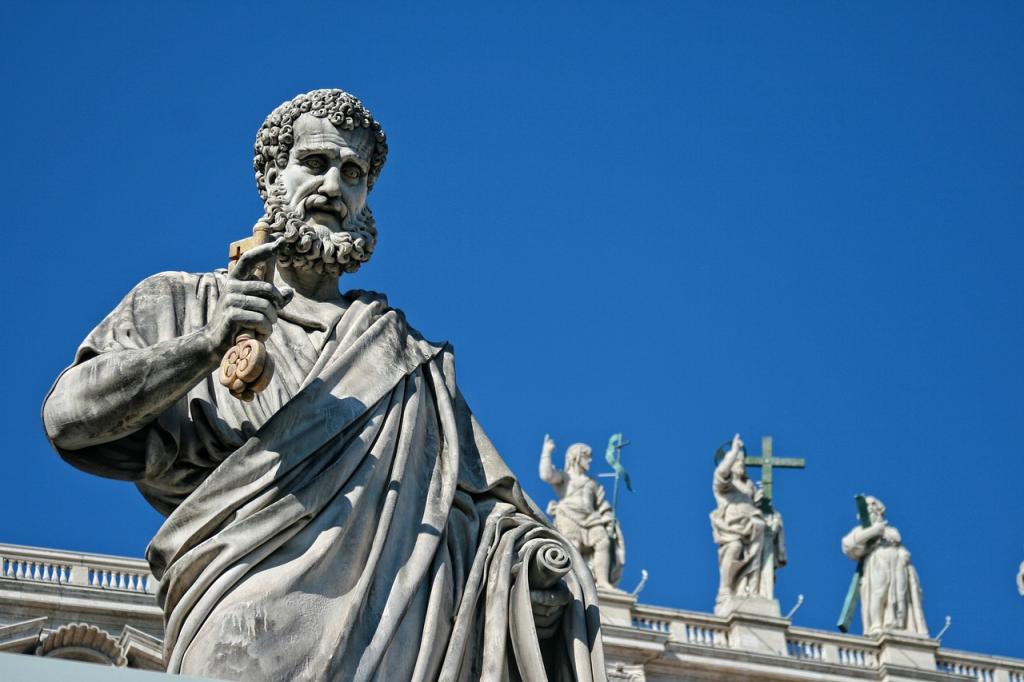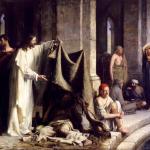Over the centuries, Christians have used the word faith in many different ways.
From the texts of the Hebrew Bible and New Testament up through statements of conciliar councils and theologians, there have been numerous understandings of what faith is and how it comes about.
Is faith a kind of knowledge, the “evidence” of things hoped for, as St. Paul says?
Or is it a kind of trust – in the Bible, the teachings of a church, or in God?

If faith is trust and not knowledge, then on what is this trust based on if not knowledge?
If a wife trusts her husband, is not because she has profound knowledge of him?
And if evidence is not necessary for faith, or even antithetical to it, then how does it differ from mere delusion?
As early as the New Testament, it’s clear that the word “faith” – pistis in Greek – can have a variety of meanings.
Faith as a Body of Beliefs
In many instances, faith is simply a synonym for trust – as when Jesus tells his disciples, “have faith in God (Mk 11:22, ESV).”
In other contexts, faith is more about loyalty to someone.
In still other contexts, faith carries a propositional content and thus has to do with belief. For example, the author of Hebrews declares that “by faith we understand that the universe was formed at God’s command” (11:3, ESV).
It appears faith can also mean a collection of beliefs, as in Ephesians 4:13, where the author speaks about the variety of teaching ministries in the early community so that “we all attain to the unity of the faith – with the definite article, “the” (τῆς) faith – “and of the knowledge of the Son of God.” In this context, it appears faith in some sense conveys “knowledge” (epignōseōs).
Finally, Paul (or the scribe who helped to write Ephesians) exhorts his colleague Timothy to “guard the deposit (parathēkēn) entrusted to you (6:20, ESV).”
This implies that, within 30 years of Jesus’s crucifixion, Christian faith was already envisaged as a body of beliefs that had to be “guarded” and preserved.
Aquinas on the Nature of Faith
In the Summa Theologica, Aquinas uses the word “faith” (fides) in two senses: first, as a body of beliefs (what he calls the articles of faith) some of which are necessary for salvation; and, second, as an act of the intellect by means of which one comes to accept these beliefs as true. Aquinas defines this second meaning of faith as an intellectual virtue, or habit, by means of which persons come to know the truths necessary for their salvation.
Faith is, he says, “a habit of the mind, whereby eternal life is begun in us, making the intellect assent to what is non-apparent (ST II-II.4.1, co.).” Aquinas cites the Letter to the Hebrews in affirming that faith is itself a kind of evidence, “the evidence of things unseen (11:1).” In this, Aquinas says, faith is distinguished from all other things pertaining to the intellect. Normally, evidence induces the intellect to “adhere” to a truth; but in the case of faith it is, in a sense, the opposite: “the firm adhesion of the intellect to the non-apparent truth of faith” is what the author of Hebrews calls “evidence.” (ST II-II.4.1.co.).
Believing What We Do Not See
In modern terms, Aquinas seems to be saying that the beliefs that form the basis of faith are “properly basic,” that is, they are accepted as true without the evidence, arguments and demonstrations through which the truths discovered by human reason are normally established. In support of this view, Aquinas cites such authorities as Augustine (“faith is a virtue whereby we believe what we do not see,” Tract. xl in Joan.: QQ. Evang. ii, qu. 39) and Damascene (“faith is an assent without research,” De Fide Orth. iv, 11). (See ST II-II.4.1.co.)
As for how such belief in the truths of faith comes about, Aquinas states that the act of believing is (1) “an act of the intellect (2) assenting to divine truth (3) at the command of the will (4) moved by the grace of God (ST II-II.2.9, co.).” In Aquinas, both the will and divine grace (which he calls a supernatural principle moving someone inwardly) play crucial roles in the act of belief.
Aquinas anticipates future arguments in analytic epistemology that belief is by nature involuntary when he raises the objection that if a person has a sufficient “motive” for a belief, then “he is no longer free to believe or not to believe” (ST II-II.2.9, ad 3) and that therefore no merit accrues to such a belief. Aquinas even concedes that there are cases in which the “motives” (evidence?) for belief are so overwhelming that such belief is indeed involuntary and therefore without merit: for example, when a scientist is obliged to assent by the deductive force of a demonstration or when the demons believe that God exists.
Faith is Itself Evidence
However, when it comes to matters of faith, arguments and demonstrations can sometimes “remove obstacles to faith, by showing that what faith proposes is not impossible” (ST II-II.1.9, ad 2) yet arguments and demonstrations do not themselves establish the articles of faith.
This is because, as the British philosopher Richard Swinburne points out, for Aquinas the type of belief involved in faith is not the same as “scientific knowledge (scientia),” although it is more certain than mere opinion (opinio).
Scientific knowledge for Aquinas means believing a proposition is necessarily true and also understanding why it is true (Swinburne, 2005: 139), while the beliefs of faith involve propositions that are true but which human beings cannot understand (139).
Thus, for Aquinas, there are three types of belief: those based on necessary (certain) demonstrations; those based on contingent evidence (opinion); and those based on faith.
The beliefs of faith are halfway between those of scientific knowledge and opinion. They possess the certitude of scientific knowledge but without the understanding (ST II-II.1.4).

Robert J. Hutchinson is an award-winning Catholic writer.
He is the author of numerous books of popular history, including Searching for Jesus: New Discoveries in the Quest for Jesus of Nazareth (Thomas Nelson), The Dawn of Christianity (Thomas Nelson), The Politically Incorrect Guide to the Bible (Regnery) and When in Rome: A Journal of Life in Vatican City (Doubleday). Born and raised in the Pacific Northwest, he attended Catholic schools, studied philosophy at a Jesuit university, moved to Israel to learn Hebrew, and then earned a degree in New Testament studies.












